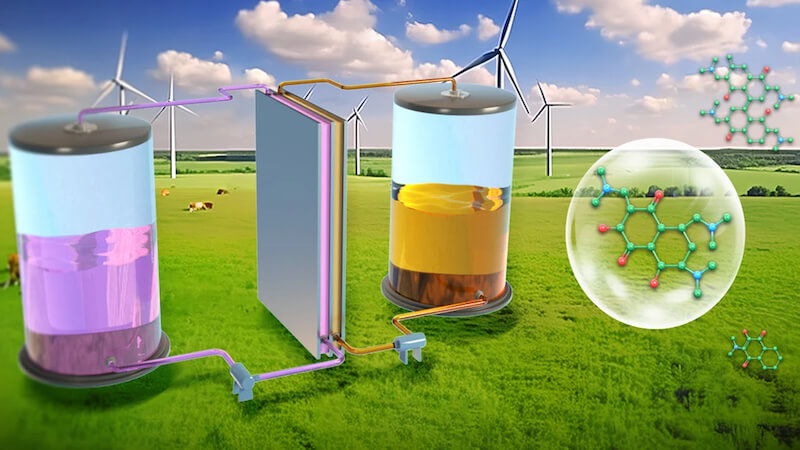
Researchers at the Dalian Institute have developed air-stable organic molecules that appear to be able to significantly increase the lifespan of liquid batteries. The backgrounds.
Researcher of the Dalian Institute of Chemical Physics (DICP) have developed novel air-stable organic molecules. These are said to have the potential to significantly increase the lifespan of batteries. The so-called naphthalene derivatives would significantly improve the air stability and cycling performance of organic redox active molecules (ORAMs) in aqueous organic flow batteries (AOFBs).
This leads, among other things, to an extended battery life. The development could enable sustainable energy storage in a cost-effective manner. ORAMs are available in large quantities and can be synthesized using simple chemical and electrochemical methods.
Air-stable molecules are intended to increase the lifespan of liquid batteries
However, a major problem with ORAMs is instability when in contact with air. The result: an irreversible loss of capacity, which negatively affects the lifespan of batteries. But by using the new naphthalene derivatives with hydrophilic alkylamine frameworks, the researchers were able to solve the problem.
These frameworks protect against undesirable side reactions and at the same time improve solubility in aqueous electrolytes. In tests, an organic flow battery with these naphthalene derivatives showed stable performance even after over 850 charging cycles.
Even with continuous airflow, the battery remained stable for over 600 cycles. The results underline the exceptional air stability of the new molecules.
Scaling for future applications still open
The researchers were able to expand the production of the naphthalene derivatives to a kilogram scale (5 kilograms per batch) and tested them in a pilot battery system. The battery achieved a relatively high cycle stability of over 270 charging cycles, during which the capacity only decreased by 0.05 percent per cycle.
The research results could pave the way for the development of long-lasting, air-stable energy storage systems. As part of the energy transition, these play an important role, particularly in sustainable energy supply.
Also interesting:
- Surprising discovery: Researchers increase the performance of lithium-ion batteries
- Smaller than a grain of sand: Researchers are developing batteries for tiny robots
- Researchers develop the world’s first sodium battery without an anode
- Flash Joule Heating: Sustainable recycling of lithium-ion batteries
The article Researchers increase the lifespan of liquid batteries – with air-stable molecules by Felix Baumann appeared first on BASIC thinking. Follow us too Facebook, Twitter and Instagram.
As a Tech Industry expert, I find the development of increasing the lifespan of liquid batteries with air-stable molecules to be a significant advancement in battery technology. This innovation has the potential to revolutionize energy storage systems, making them more reliable and longer-lasting.
Liquid batteries are already known for their high energy density and fast charging capabilities, but their short lifespan has been a major drawback. By incorporating air-stable molecules, researchers are addressing this issue and paving the way for more sustainable and efficient energy storage solutions.
This breakthrough could have far-reaching implications for various industries, including renewable energy, electric vehicles, and grid storage. It could also help accelerate the transition towards a cleaner and more sustainable energy future.
Overall, I am excited about the potential of this research and look forward to seeing how it can be commercialized and integrated into practical applications in the near future.
Credits